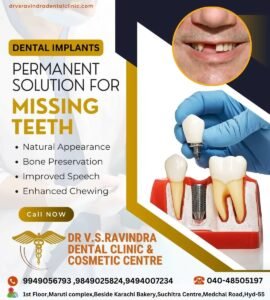Dental health is a crucial component of overall well-being, and advances in dental technology have made it easier to restore and maintain a healthy smile. One of the most significant developments in dental care is the dental implant. This blog will explore what dental implants are, the benefits they offer, the procedure involved, and considerations to keep in mind.
What are Dental Implants?
Dental implants are artificial tooth roots, typically made of titanium, that are surgically placed into the jawbone. They serve as a sturdy foundation for fixed or removable replacement teeth designed to match your natural teeth. Unlike dentures or bridges, implants fuse with the bone, providing a permanent solution to tooth loss.
Benefits of Dental Implants
1. Natural Appearance and Comfort
Dental implants look and feel like your own teeth. Because they are designed to fuse with bone, they become permanent. This natural appearance and integration ensure that your smile looks authentic and that your implants feel just like your natural teeth.
2. Improved Speech
Unlike poorly fitting dentures, implants allow you to speak without the worry that teeth might slip. This stability ensures clear and natural speech, enhancing communication confidence.
3. Enhanced Comfort
Since they become part of you, implants eliminate the discomfort of removable dentures. The secure fit of dental implants ensures there are no embarrassing slippages or need for adhesives.
4. Easier Eating
Dental implants function like your own teeth, allowing you to eat your favorite foods with confidence and without pain. Their robust structure can handle all types of food, ensuring you can enjoy a diverse diet.
5. Improved Self-Esteem
Implants can give you back your smile and help you feel better about yourself. The restoration of a full set of teeth can significantly boost your self-esteem and overall quality of life.
6. Durability
Implants are very durable and can last many years. With good care, many implants last a lifetime. This longevity makes them a cost-effective solution over the long term.
7. Bone Health
Implants help prevent bone loss and maintain the structure of your jawbone. Unlike dentures, which can lead to bone erosion over time, implants stimulate the jawbone and preserve its strength and shape.
The Dental Implant Procedure
The process of getting dental implants involves several steps, typically spread out over a few months:
1. Initial Consultation
Your dentist will conduct a comprehensive dental exam, including X-rays and 3D images, and review your medical history. This step determines whether you are a suitable candidate for implants. Factors such as bone density and oral health are crucial in this assessment.
2. Treatment Plan
Based on your individual situation, a tailored treatment plan is created. This plan outlines the number of implants needed, the health of your jawbone, and the timeline for the entire process.
3. Tooth Extraction
If there is a damaged tooth present, it will be removed. This extraction is often straightforward, but in some cases, it may require more extensive surgical intervention.
4. Jawbone Preparation (Grafting)
Sometimes, bone grafting is necessary to create a solid foundation for the implant. If your jawbone isn’t thick enough or is too soft, you may need bone grafting to ensure the implant is securely anchored.
5. Implant Placement
The titanium post is surgically inserted into the jawbone. As the bone heals, it grows around the implant, anchoring it securely in the jaw. This process, known as osseointegration, can take several months but is crucial for the stability of the implant.
6. Abutment Placement
Once the implant is securely bonded to the bone, an abutment (a small connector post) is attached to the implant. This abutment will hold the new tooth in place.
7. Crown Placement
After the gums heal, a custom-made crown is attached to the abutment. This crown is crafted to match your natural teeth in size, shape, and color, ensuring a seamless integration into your smile.
Considerations and Aftercare for Dental Implants
Eligibility for Dental Implants
Not everyone is a candidate for dental implants. Good candidates must have healthy gums and adequate bones to support the implant. Those with chronic conditions such as diabetes or heart disease need to be evaluated on a case-by-case basis. Smoking can also affect the success of implants, so quitting is highly recommended.
Potential Risks and Complications
As with any surgical procedure, there are risks involved with dental implants. These can include infection, injury to surrounding teeth or blood vessels, nerve damage, and sinus problems. However, these risks are relatively rare and can be minimized with proper care and by choosing an experienced dental professional.
Post-Procedure Care
After the procedure, maintaining excellent oral hygiene is critical. Regular brushing, flossing, and dental check-ups will help ensure the longevity of your implants. Your dentist will provide specific instructions on caring for your implants, including what foods to avoid during the healing process.
Long-Term Maintenance
Long-term success of dental implants depends on good oral hygiene and regular dental visits. Unlike dentures, implants do not require special cleaning products or adhesives. However, using antibacterial mouthwash and avoiding hard foods can help maintain their condition.
Cost of Dental Implants
The cost of dental implants can vary widely based on several factors, including the number of implants needed, the complexity of the procedure, and the geographic location of your dental provider. While implants can be more expensive than other tooth replacement options initially, their durability and permanence make them a cost-effective solution in the long run. Many dental offices offer financing options to help manage the cost.
Conclusion
Dental implants represent a revolutionary advancement in dental care, offering a permanent and natural-looking solution to tooth loss. Their numerous benefits, from enhanced comfort to improved bone health, make them an excellent choice for those seeking to restore their smile. By understanding the implant procedure, potential risks, and aftercare requirements, patients can make informed decisions and enjoy the long-term advantages of dental implants.




